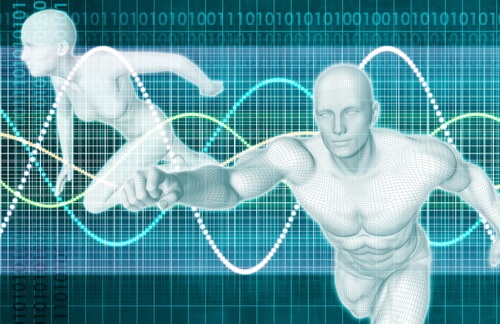
The practice of analytics has been around for decades. Recent advances in data collection and management technology have broadened its scope significantly. Analytics jobs focusing of data and statistics have become prolific throughout most major sports. In fact, a large portion of professional teams in the United States now routinely draw on the services of professional statisticians to support their operations. Tracking a baseball player’s batting average as a basis for measurement of potential or ability is just one of many examples of analytics jobs.
Related Resource: How Much Do Kinesiologists Make?
How are Analytics Used in Sport? The Sports Analytics Definition

So, what is sports analytics? Essentially, sport analytics is the practice of applying mathematical and statistical principles to athletics and related peripheral activities. While many factors and priorities are specific to the industry, sports analysis uses the same methods and principles. Establishing parameters for measurement, like hit or fumble rate, and consistently collecting data from a broad sample is the basis of analytics in sports. This data is then curated and optimized to improve the accuracy and usability of the results.
Traditionally, teams have used data analytics in sports. They have made important decisions about drafting and recruiting athletes using:
- statistics
- observations
- intuition
They’ve also used these methods to assess player performance. Statistics have always played an important role is evaluating player performance. High powered analytical tools can now be used to get a clearer and more detailed picture of player performance. A sports data analyst can help teams make better informed decisions about utilization of talent.
The use of analytics was highlighted in the 2011 film “Moneyball.” The film tells the true story of the 2002 Oakland A’s who used sports analytic data to build successful team with a limited budget. They were able to use specific metrics to acquire undervalued players and make decisions about how best to use the talent they had. Analytics jobs go beyond traditional statistics. They add accurate analysis to improve factors in team performance.
On-Field Applications

Analytics has many on-field applications in a sport environment. Analytics sports roles include managing both individual and group performance. Coaches can use data to optimize exercise programs for their players and develop nutrition plans to maximize fitness. Sport analysis is also commonly used in developing tactics and team strategies. With thousands of games worth of data to study, analysts can look for patterns across a broad sample size regarding formation, counter strategies and other key variables.
Analytics Jobs in Team Management

Practical data analysis has plenty of applications for the business side of sport as well. Most professional athletic teams function as businesses. They are always seeking ways to improve sales and reduce expenses across their organization. Some analysts specifically focus on issues regarding the marketing and sale of sports tickets and team merchandise. Modern marketing and fan outreach efforts also rely heavily on analytics to predict their consumer base and identify opportunities to increase brand engagement.
Academic Degrees in Sports Analytics

There are several degrees that can lead to a career in sport analysis.
A degree in statistics and data analysis will provide the skills necessary to pursue a career in sports analytics. Some schools offer a bachelor’s degree in Sports Analytics. These programs offer coursework that studies such topics as:
- game theory
- economic strategy
- probability and statistics
- sports management
- web scraping
- programming
- database management
- sports data analysis
Graduates from these programs are uniquely qualified to enter the sport analytic field.
Some schools offer a concentration in sports data analytics within their Sports Management department. This allows the student to develop skills in statistics and analytics. They also develop an overall understanding of the field of Sports Management. Students who have already completed their bachelor’s degree may want to look into pursuing a master’s degree in Sports Analytics. These programs offer in-depth study of data science and predictive analytics as related to sports management and sports performance.
Related Resource: What Does A Sports Nutritionist Do?
Sports Analytics Jobs

On a professional level, sports analyst falls under the umbrella of a statistician and other analytical fields. Some professionals specialize or expand their academic programs with sports-related courses. Professionals can complete their job on location or remotely. Many have a degree in statistics or a related mathematical field. Professionals may apply these skills in a number of settings, including sports team management. Overall, statistician careers in the US are projected to rise significantly through 2030, with a current median annual wage of roughly $96,280 across the profession, according to the U.S. Bureau of Labor Statistics.
One of the major employers of sports analytics professionals are professional and college sports programs. Statistics are a vital part of any sports program. Sports analytics help teams make sense of their data and apply it to practical solutions in the program. This analysis can help increase performance on and off the field. Player statistics can be used to make informed decisions about:
- athlete performance
- game strategies
- recruitment strategies
Off the field, sports analytics can be used to analyze information about:
- fan engagement
- ticket sales
- concession sales
This analysis can help the company run more efficiently.
Related Resource: The Best Sports Statistician Jobs
Media Companies
Sports media companies use sports analytics to enhance their sports reporting including:
- ESPN
- Fox Sports
- Sports Illustrated
Fans will likely be turned off by a strict discussion of statistics. Sports analytics can help put sporting events and outcomes into perspective. This gives fans a greater context to appreciate athlete performance or game outcomes. For example, if a team comes from behind to win a game it is exciting, but it is even more interesting if you know that the probability of that outcome was 0.1%. Sports analytics can be used to improve reporting on sports events and engage fans. They can also increase entertainment value.
Technology and Wearables
Wearable technology companies are becoming essential to the world of sports. These companies need sports analysis professionals to develop their products. Wearable technologies collect an enormous amount of data from athletes. Sports analytics plays a role in analyzing this data as well as specializing data collection for specific results.
Related Resource: Do I Need a Degree in Sports Journalism to Become a Sports Journalist?
Training Technology
Sports analytics also plays an important role in the development of training technology such as simulators and virtual reality devices for athletes. Data analysis greatly enhances the accuracy of these simulations. Athletes and coaches try out strategies in different game situations to prepare for many on field scenarios.
Human Performance Labs
Sports analysts may also find jobs in human performance labs. These labs use specific athlete training data to fine tune performance and increase training efficiency. Sports analytics plays a role in developing data driven training programs to increase an athlete’s competitive edge.
In Conclusion

What is analytics in sports? It is a growing field of data science with new and exciting uses being developed everyday. With hundreds of professional and college teams across various leagues, there are many ways to leverage data to gain a competitive or commercial advantage. Many fans are also interested and engaged with data-driven presentation. It is crucial for to businesses that conduct gambling and other gaming operations.
Athletes want to pinpoint performance and gain a competitive edge. Sports data analytics can help maximize athletic performance. Analytics have practical applications on and off the field. They are essential to virtually every aspect of sport management.